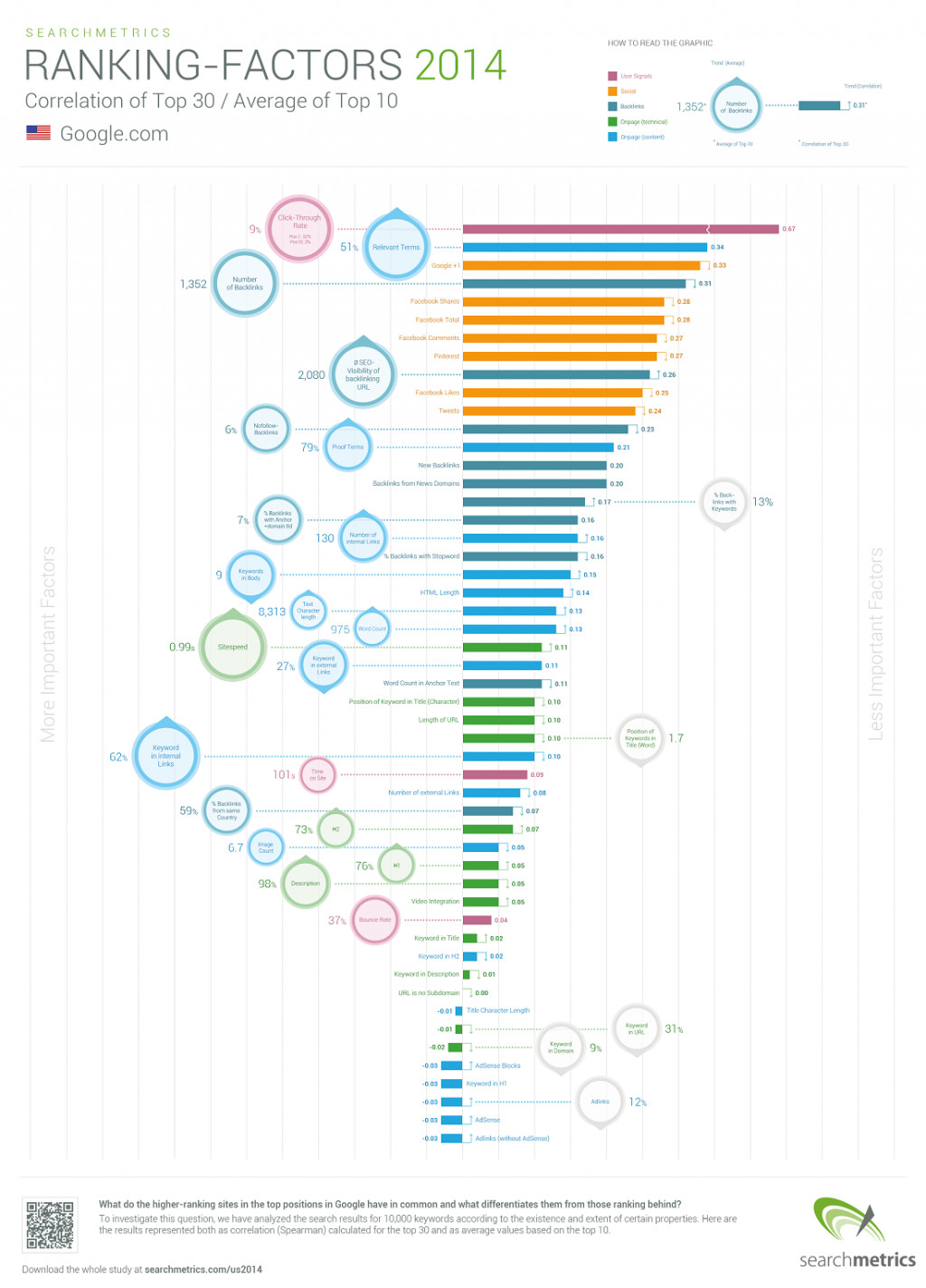Search Traffic - Let's look at the main factors
Every year, SearchMetrics produces an exhaustive report on how various 'ranking factors' for webpages influence where they appear in organic Google search results.
The report is designed to give an insight into how various aspects of a webpage correlate to a better position in search. They analyze tens of thousands of search terms and hundreds of thousands of results to find the factors that contribute most (and least) to good placement.
You can download the entire (80 page plus) report here: http://www.searchmetrics.com/knowledge- … g-factors/
Here's a graph of the main factors:
You can also see a very informative Infographic of the main factors here: http://www.searchmetrics.com/wp-content … s-2014.jpg
If you'd prefer not to read the whole report (not everyone is as fascinated by obscure stats and analysis as me), the summary is below, together with my brief thoughts on each one.
Our results yielded a need for greater emphasis on high quality, relevant content, technological features, backlinks and social signals. For the first time, we have analyzed the most important user signals as well.
- Content: High quality, relevant content ranks better on average, and is identifiable by properties such as comprehensive wording in regard to the co-occurrence of related terms in the context, a higher word-count and media enrichment.
What can HP authors do?
- Generally, more words are better, provided they are relevant and add to the topic
- Do not stuff with keywords; write naturally
- Include other media such as images and video where it makes sense
- Aim for original research or an interesting approach to a topic
Technology: A well optimized technical performance of a page contributes to a good ranking, such as, robust site architecture with an optimal internal linking structure, short loading times and presence of meta tags.
What can HP authors do?
- Don't include masses of images as these can slow loading times
- Think about hiding the older comments if the comment counts are becoming too large
- Link internally within your hubs to other relevant hubs
- Link to other hubber's hubs
- Make sure that all of your hubs have good titles and enticing descriptions
Backlinks: The quantity and quality of backlinks remains crucial as there are many new features introduced this year that have been revised to improve the quality of the results.
What can HP authors do?
- Link between your hubs
- Link to other sites (inside and outside HP) that have authoritative content related to your subject
- Comment on other articles / blogs / communities / content and include a link back to your hub if it makes sense and adds to the discussion (note that you are not allowed to do this on HP itself or hubs hosted here) - Also, be careful to avoid spamming links
- Look into guest blogging; although it has partly fallen out of favor with Google, you can still create good backlinks if you don't oversaturate and choose to write for high quality blogs
Social Signals: The correlation values regarding coefficients out of the social sector have slightly decreased. The growth of the average total number of signals per position was rather small.
What can HP authors do?
- Post your work to the various social networks where it makes sense to do so
- Networks include: Facebook, Google Plus, Twitter, LinkedIn, Pinterest, StumbleUpon, Tumblr and more
- Write good titles and descriptions to encourage people to share
User Signals: For the first time, user signals were measured and as expected there is a relation between rankings and higher click-through rates, lower bounce rates and a high time-on-site.
What can HP authors do?
- Click Through Rate was the highest correlated factor; this means that if your site shows up in search, would a user click on it? You can influence this in several ways:
- Write a great title for your hub
- Write an interesting description (directly below the title in the HP editor) - Using calls to action and active language like 'Find out more about' or 'Learn how to' can be effective
- Lower the bounce rate on your pages by linking to your other hubs
- Increase time on site by providing compelling, beautiful, easy to read content
- Use other media to enhance your topic
I hope that all of this helps and provides some food for thought. Please do add to it with any hints tips or insights that you have.Thank you for this. I especially appreciate that you gave us specific actions we can take, since I don't understand most of the theory and even some of the lingo behind it.
Very helpful and concise. Really appreciate the work you put into this!
Hi Paul, thank you for condensing all of this and sharing it with us.
Thank you for the information. It is helpful to know.
Good summary Paul and very useful.
I would add a couple of points:
1. You state that "Click Through Rate - means that if your site shows up in search, would a user click on it?" I thought that Click Through Rate refers to clicking ads on the page once displayed, or other 'call to action' links on the page. Nevertheless, the snippet - the small text that appears in the SERPS is very important for enticing readers to 'click me' on the summary list.
2. While making Google happy is a good aim - I suggest that providing what the users wants, understanding what they need and how best to satisfy them should be the key drivers. => User satisfaction, which is hard to measure, but which is the key focus for Google. Aim to satisfy the user, smartly and concisely and you will be on the right track. Stuffing hubs with stuff designed to increase dwell times/engagement (media, tables, excess images etc.) should be done with caution as it can frustrate users, especially those on mobile devices. Good efficient layout, with well organised content in subsections, dot points is a better way to go. This requires a lot of work and insight into how you user thinks, what they need, and how best to deliver it. IMO of course.I did double-check on CTR following your first point and it does relate to the likelihood of the user clicking on a particular link once they have searched. Apparently, this is a new ranking signal for Google and has a very strong correlation with doing well on SERPs.
I completely agree with your second point. Ultimately, content that is easy to read and satisfies user intent will rank the best.Thanks for checking. This is a different use of the term CTR. The article makes the following point in relation to SERP position and CTR:
"If the user clicks, they stay longer on pages that are higher ranked. Users who click on the first SERP result stay on the page, on average, 30 seconds longer than those who click on a page on position 4. This trend continues as one moves down the rankings.
But it should be noted that the visit time also depends on the type of search and the result. The motivation and purpose of the user for certain information will shape the visit, for example when looking at a sports result from the night before, the visit will usually be very short."
This is such a useful post, Paul. Thanks for taking the time to share. I'm posting this thread on the HubPages Twitter and Facebook accounts (with credit to you, of course) so that hopefully more Hubbers will see and benefit from your tips.

Thanks for posting this, Paul - I love this sort of thing - I'm still learning the SEO world of publishing, and having to cram my learning time into a busy schedule of other priorities.
I wish we could have a 'conference' of people on this site (not a virtual conference - a real one), where speakers could present things in ways that would help all of us, and help HP. I believe in the site, but my enthusiasm is waning. I know I could learn a lot from people like you and many others.
And - it would be fun to meet each other in person. I'd gladly pay my way to attend.This is very useful Paul, with lots of important items to review with our hubs.
I routinely review my hubs with Google Analytics and make many changes based on what I learn from Google. I do more of that than I do writing new hubs. I especially like to keep an eye on the search queries that Google shows I'm ranking on.
I find that it pays to fine-tune existing hubs based on the Analytics reports.I agree - One of the most useful parts of that is going to Reports > Acquisition > Search Engine Optimization > Queries - If you've linked analytics to Webmaster Tools, it will tell you everything that users typed in which your article appeared for.
This can be *incredibly* helpful when it comes to tweaking articles and expanding on content.
Well presented. I just want to add something you probably already know, that many of the things you mentioned are the reasons HubPages recommends 1250+ words, 3 pics, attractive media, etc in the Hub goals. I know some Hubbers think those things don't make sense, but we need to remember that, if we are interested in getting traffic and ranking well, what we *think* makes sense doesn't really matter. What matters is the what the research shows, as you have broken down in this post.
I truly wish HP would spend more time and resources on educating Hubbers on topics such as this.Yes, I know that HP uses SEO consultants, so I am confident that's why the Stellar Hub instructions correlate closely with what ranks well in Google. The interesting takeaway from me is that Click Through Rate is a huge indicator, so writing great titles and descriptions is one of the easier things that we can do to encourage better rankings.
To add to your discussion on CTR (again something I'm sure you already know) Webmaster Tools is indispensable for gauging the effectiveness of title/summaries. Under Search Traffic > Search Queries > Top Pages it is easy to compare impressions vs clicks. A poor ratio might mean our title and/or summary needs work, or a competitor is doing a better job of attracting attention.
Then again, sometimes it could just mean we're ranking for a weird keyword. Still useful for assessing Hubs though.
Still useful for assessing Hubs though.Sorry but this statement does not match the SERP results:
"Stellar Hub instructions correlate closely with what ranks well in Google' If you analyze the top 5 results for most searches it is remarkable how many short articles often appear in the top 2 or 3 positions. Similarly many high traffic hubs have low hubscores (which is now based more on quality = QAP). The fact that simple short articles often rank well, is not an accident by Google, nor an aberration (a sign of imperfection for the bot) IMO. It is a reality! Google ranks them higher, despite NOT being Stellar-Like. Google loves them! Users love them!
While general guidelines, matching the average, are a good idea, there is clearly other factors at play ( not errors). To emphasize the point again, that I have made elsewhere, I write purely to satisfy what the readers for the niche want in a simple, concise and smart way - I do not use a formula trying to predict what Google will like, by adding stuffing! Just my opinion of course - Do what you see as best for your niche and audience. Know what you audience wants and deliver it. Being able to compete for traffic is another key driver. Great Stellar hubs don't necessarily get traffic. Another perspective IMO.While on an anecdotal level, for specific queries, specific short articles may rank well, taken as a *general* concept, longer articles with rich content, an interesting approach, lots of images and other media *do* rank better than other articles, according to the research supporting the report.
That's not to say that for specific queries in particular niches shorter articles won't do better. (And of course the algorithm is changing all the time, so it might turn out than in 2015 there is an overall trend towards shorter articles; we'll see in the next report)
In the meantime, I think that the stellar hub guidelines are a good *starting point*. Of course, if you know your audience prefers shorter articles, or a different type of content, it makes sense to adapt to that. However, until that data is available, personally I prefer to stick to the more proven principles.Maybe now the number of clicks matter as advertisers pay on this basis but some of them are now moving towards the amount of time their ads are displayed in front of readers. Financial Times is doing a pilot with some advertisers and they are beginning to see the value. Time count starts after 5 seconds but withheld pilot, this will be moved to 3 seconds. If more advertisers go for this, then, reader dwell time will have more value than clicks.
I've definitely seen shorter articles ranking very well, very often. I've never totally agreed with the advice about writing longer articles. Answering a query sufficiently and writing a good article generally is what works. It stands to reason readers want sufficient and concise answers that are easy for fulfilling their need, basically. Google even provides a Quick Answer box at the top of the SERPs; seems there's a reason for that.
I also absolutely agree that it's not necessary to follow a formula. What makes sense most often has absolutely nothing to do with a formula.
What useful tips! I learned allot! I don't word stuff but I am a photo nut so I will have to learn to restrain myself.
Always learning, always growing - thank you for helping in my journey.Thanks Christy - I am also in the process of turning this information into a hub; I'll let you know when that's completed.
I read today that the URL is still very important in this regard. Keywords in the URL show up in search and often will influence whether a user clicks through. Structure URLs that are easily readable by humans. Obviously domain bias also influences a click through.
I question whether creating backlinks is a good idea. Google prefers natural backlinks, and that's the general idea; that you just get backlinks because people like your articles. I think it's possible to get significant traffic and get backlinks, plus social media shares, without going out after backlinks and without sharing your own content. As far as social signals go, I think it's like the backlinks; supposed to be natural. Which, to me, makes sense.
Very well summarized for us non-techie types.
Interesting, as well, about the sharing issue. I share hubs I find interesting, and where I share depends on many things, including the nature of the topic, and how broadpbased I think the interest might be...and there's no assurance that I'm correct, since I'm far from a Google mind-reader!
Some I share right here, via the HP share link; others I pin to a specific board on my Pinterest account; some I share generically to FaceBook, and others I share to my FaceBook/DzyMsLizzy on HP page. But I am not an indiscriminate "share everything" type of person. I probably share a max of a dozen things in a month or so...if that.
As for my own traffic, I'm not tech-savvy enough to be able to figure out the tools that are recommended for figurining it out...I just end up confused.
My blogs are very neglected, and produce near zero traffic, so there's no point to linking there. I cannot guest blog, as I am already spread too thin ...
(and please pardon any typos I did not catch, as my cat is in my lap "helping" my type by shoving his face into the backs of my hands!)Thanks for all of this information. I do have a question about images. You stated that we should not add excessive images (because of slower loading time, I assume) but in a post the other day you recommended that we have more images so that our hubs would come up more often on the Google image search. Which do you think is the better method?
I think that including 3-5 images or so in a hub is fine; I would thing excessive images would be more than about 8 or 10.
Related Discussions
- 27
Is less than 700 words acceptable?
by Larry Taylor 2 years ago
I understand why HB likes longer articles, and on some subjects it's easy to reach 700, 800, or more words. Sometimes though, I say everything I want to say on a topic and I'm done at between 450 and 600 words. Trying to add more text to reach the recommended minimum of 700 makes the hub look......
- 361
I really think this Idled hubs idea is ridiculous
by Steve Andrews 13 years ago
When it was first introduced I was annoyed by it but made an effort to tweak my hubs to get them out of Idle status. Now, a whole load have got zzs against them again and many of them are hubs that at one point were very successful and even now still have scores above 70 or higher.One of the hubs...
- 56
What do you do to increase traffic to your hubs and potentially increase AdSense
by Lena Kovadlo 12 years ago
What do you do to increase traffic to your hubs and potentially increase AdSense earnings?
- 366
How the Google Algo Affected Your Content - Let's Work it Out
by Susana Smith 14 years ago
There have been several theories about what content Google is penalising and rewarding in the search results but at the moment it does seem a bit random (from my end). Let's compare notes and hopefully we can see some common threads in there. What content of yours is holding on to its ranking and...
- 15
which is better, few good content hubs or many average hubs?
by Connie Ho 16 years ago
Hi I have joined Hubpages for some weeks now. I have decided to get out of my shell and connect with fellow hubbers. Writing is a lonesome endeavor. It is time consuming especially if you aim for good content. I have written 2 hubs now. Both are fine. One ranks well on Google with the right keyword...
- 43
Sub-Domain change-Author as a "Brand"-More accounts needed for Topics?
by Michael Willis 14 years ago
The Sub-Domain introduced to us here at Hubpages is suppose to help our hubs/writing to be separated out from the entire HP site to be...how do I say this?...judged by Google for quality and credibility by author?I noticed after a slow beginning the first couple of weeks, after I made the...

























